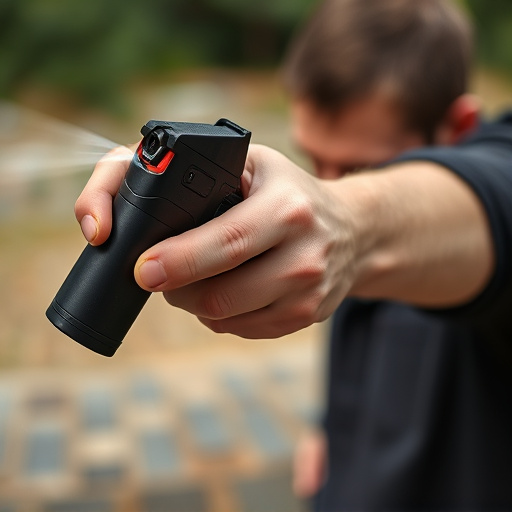Decontaminating your skin after exposure to pepper spray is crucial for safety and effectiveness, involving immediate rinsing with water for 15 minutes or more. Store pepper spray securely in a cool, dry place away from children to prevent accidental discharge. Regularly inspect and clean the storage area. After contact, quickly move to a safe location, flush affected areas with water, and use mild soap and warm water to further decontaminate. Proper handling, including secure storage, training, and adherence to local laws, is vital for responsible pepper spray ownership.
In today’s world, self-defense is a crucial consideration for personal safety. One popular tool gaining popularity is pepper spray, but understanding its safe use and handling is essential. This article delves into the intricacies of pepper spray as a self-defense weapon, covering its composition, effects, and safe practices. Learn about responsible ownership, legal considerations, and critical decontaminating steps to take after exposure to ensure your well-being.
- Understanding Pepper Spray: Its Composition and Effects
- Safe Handling and Storage of Pepper Spray
- Decontaminating Skin After Exposure: Steps and Precautions
- Legal Considerations and Responsible Ownership
Understanding Pepper Spray: Its Composition and Effects
Pepper spray, a popular self-defense weapon, is designed to incapacitate an attacker temporarily. Its composition includes capsaicin, the active ingredient found in chili peppers, along with various other chemicals and ingredients that enhance its effectiveness. When deployed, pepper spray irritates the eyes, nose, throat, and skin, leading to temporary blindness, coughing, and difficulty breathing. Understanding these effects is crucial for users to know how to decontaminate their skin if exposed.
After coming into contact with pepper spray, it’s important to quickly decontaminate the affected areas. This involves rinsing the eyes and skin thoroughly with water for at least 15 minutes. Users should also remove any clothing or accessories that may have absorbed the spray. Seeking medical attention is advisable if symptoms persist or severe reactions occur. Proper decontamination procedures ensure users remain safe and effective, even after accidentally coming into contact with their own pepper spray.
Safe Handling and Storage of Pepper Spray
Proper handling and storage are crucial aspects of ensuring pepper spray remains effective and safe for self-defense purposes. Always keep the canister in a secure, dedicated location, away from children and unauthorized individuals. Store it in a cool, dry place, preferably in a locked drawer or cabinet. This prevents accidental discharge and maintains optimal performance.
In case of contact with skin or eyes, immediately decontaminate the affected area. Rinse thoroughly with water for at least 15 minutes to dilute and remove any pepper spray residue. Seek medical attention if irritation persists or symptoms are severe. Regularly inspect and clean the storage area to prevent contamination and ensure easy accessibility when needed.
Decontaminating Skin After Exposure: Steps and Precautions
After exposure to pepper spray, decontaminating your skin is crucial to ensure safety and prevent further irritation or potential health risks. The first step is to quickly move to a safe location away from the source of the spray. Then, immediately flush the affected area with plenty of clean water for at least 15 minutes. This helps to dilute and wash away any residual pepper spray chemicals.
To decontaminate your skin further, consider using mild soap and warm water to gently cleanse the skin. Pay extra attention to areas where the spray may have been more concentrated or persistent. Avoid rubbing the skin aggressively, as it can cause further irritation. After cleaning, thoroughly dry the skin with a soft towel, ensuring no moisture remains. If irritation persists, consult medical advice for additional treatment options.
Legal Considerations and Responsible Ownership
In many jurisdictions, pepper spray is a legal self-defense tool when used responsibly and in accordance with local laws. However, it’s crucial to understand that possession and use can come with strict regulations. Owning pepper spray requires a deep understanding of your rights and responsibilities to ensure safe and lawful usage. Regular training and education are essential to learn proper application techniques and decontaminate skin from pepper spray after use, minimizing potential harm to yourself and others.
Responsible ownership includes storing the spray securely to prevent unauthorized access, especially by children or curious individuals. It’s also important to keep detailed records of purchases and usage for accountability purposes. Additionally, being aware of any restrictions on where and when you can legally carry pepper spray is vital to avoid legal repercussions. Always consult local laws and seek guidance from authorities to ensure compliance.
Pepper spray can be a powerful tool for self-defense, but it’s crucial to approach its use and storage responsibly. By understanding its composition and effects, safely handling and storing the spray, and knowing how to decontaminate skin after exposure, individuals can ensure they’re prepared for any situation while adhering to legal guidelines. Responsible ownership includes being aware of local laws and using pepper spray only as a last resort, further emphasizing its role as a safety measure rather than a weapon of aggression.
